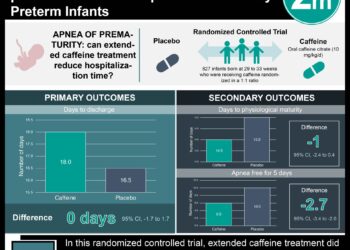Preterm birth associated with decreased fertility
1. Women who were born at <34 weeks gestation had decreased fecundability.
2. The cumulative probability of conception within 12 menstrual cycles among women born at <34 weeks was 48%.
Evidence Rating Level: 2 (Good)
Study Rundown: Preterm birth, defined as delivery prior to 37 weeks, is a major source of morbidity and mortality. It is associated with complications including cardiovascular and respiratory abnormalities, intracranial hemorrhage and infection. As medicine has advanced, a greater proportion of premature infants survive into adulthood, but they may suffer from long-term morbidities such as neurodevelopmental delay. Prior studies suggest that gestation <32 weeks and very low birth weight are associated with decreased future birth rates and prolonged time to pregnancy (TTP). It has been hypothesized that this is due to incomplete maturation of the hypothalamic-pituitary-ovarian axis in vivo in infants delivered prematurely. In the present work, authors sought to determine fecundability, the cycle-specific probability of conception, and found that women born at les than 34 weeks gestation had decreased fecundability compared to their peers delivered at term.
Strengths included prospective, population-based study design and adjustment for several confounders known to be associated with fecundability. Limitations included small sample size, use of last menstrual period for pregnancy dating and rounding of gestational age, which may predispose to misclassification. Differences in menstrual intervals (variable follicular phases), prior pregnancies (proven fertility) and time attempting pregnancy (potential marker of infertility) in the <34 week group may confound associations. Studies with more precise estimation of gestational age in both planned and unplanned pregnancies are needed to better understand the impact of preterm birth on fertility.
Click to read the study in Human Reproduction
Relevant Reading: The probability of giving birth among women who were born preterm or with impaired fetal growth
Study Author, Cathrine Wildenschild, MHSc, talks to 2 Minute Medicine: Aarhus University Hospital, Department of Clinical Epidemiology, PhD Candidate.
“Our study shows that women born at a gestational age below 34 weeks take a longer time to conceive than women who were born at term. This information may be useful for clinicians counseling such women, in providing a possible explanation for a delay in conception.”
In-Depth [prospective cohort]: This study assessed the relationship between current fecundability and prior gestational age at birth in women aged 18-40 years attempting spontaneous pregnancy. The sample population was comprised of women born at <34 weeks (n=19), 34-36 weeks (n=89), 47-41 weeks (n=2463) and ≥42 weeks (n=243). The primary outcome of interest was time to pregnancy, defined as the number of menstrual cycles required to achieve pregnancy.
Women born at <34 weeks experienced decreased fecundability compared to women born at term (FR 0.37, CI 0.17-0.81). The cumulative probabilities of conception within 3, 6 and 12 menstrual cycles were 12%, 28% and 48% respectively among women born at <34 weeks, compared with 47%, 67% and 84% in women born at >37 weeks.
Image: PD
©2015 2 Minute Medicine, Inc. All rights reserved. No works may be reproduced without expressed written consent from 2 Minute Medicine, Inc. Inquire about licensing here. No article should be construed as medical advice and is not intended as such by the authors or by 2 Minute Medicine, Inc.







